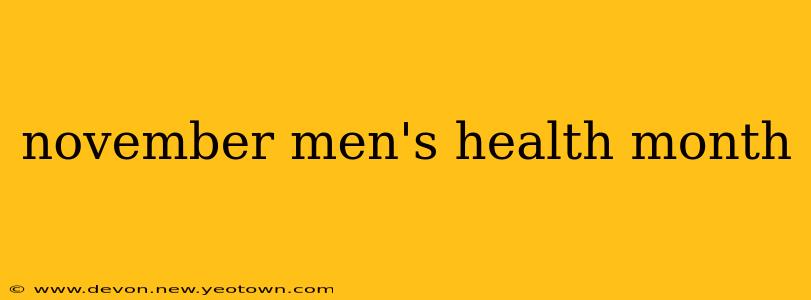November is Men's Health Month, a time dedicated to raising awareness about preventable health problems and encouraging early detection and treatment among men and boys. It's a crucial reminder that prioritizing health isn't a luxury, but a necessity for a fulfilling and longer life. This isn't just about statistics and medical jargon; it's about the stories of fathers, brothers, sons, and friends – stories of resilience, challenges overcome, and the importance of proactive healthcare.
My own journey into understanding men's health began with my grandfather. A strong, silent type, he rarely spoke about his health, a common trait among many men of his generation. It wasn't until a serious health scare that we learned how important open communication and regular checkups truly are. His experience underscored the critical need for men to prioritize their well-being and break down the societal barriers preventing them from seeking help.
Why is Men's Health Awareness Important?
Men often face unique health challenges, many stemming from ingrained societal norms and expectations. We're conditioned to be stoic, to "tough it out," often delaying or avoiding medical attention until a problem becomes critical. This reluctance can have severe consequences, leading to later diagnoses, more aggressive treatments, and, sadly, poorer outcomes. November's focus serves as a powerful catalyst to change this narrative.
What are the common health issues faced by men?
This is a broad question encompassing a wide range of concerns, but some of the most prevalent include:
- Heart Disease: Heart disease remains a leading cause of death for men, often linked to lifestyle factors like diet, exercise, and smoking.
- Prostate Cancer: Prostate cancer is one of the most common cancers affecting men, highlighting the importance of regular screenings.
- Testicular Cancer: While less common than prostate cancer, testicular cancer is highly treatable if detected early. Self-exams are crucial for early detection.
- Mental Health: Depression, anxiety, and other mental health conditions significantly impact men's well-being, often going undiagnosed and untreated. Reducing the stigma around mental health is vital.
- Diabetes: Diabetes affects men disproportionately, increasing the risk of heart disease, kidney disease, and blindness.
How can men improve their health?
The good news is that many health problems are preventable or manageable through proactive steps:
What are some simple lifestyle changes men can make to improve their health?
Making small, sustainable changes can have a profound impact. These include:
- Regular Exercise: Aim for at least 150 minutes of moderate-intensity aerobic activity or 75 minutes of vigorous-intensity aerobic activity per week.
- Healthy Diet: Focus on a balanced diet rich in fruits, vegetables, whole grains, and lean protein. Limit processed foods, sugary drinks, and unhealthy fats.
- Quit Smoking: Smoking is a major risk factor for numerous health problems. Seeking help to quit is one of the best health decisions a man can make.
- Limit Alcohol Consumption: Excessive alcohol consumption can increase the risk of several health issues, including liver disease and certain cancers.
- Regular Health Screenings: Schedule regular checkups with your doctor and follow recommended screening guidelines for age-appropriate conditions. This includes prostate exams, cholesterol checks, and blood pressure monitoring.
What are some resources available for men's health?
Numerous organizations and resources are dedicated to men's health, offering information, support, and guidance. These resources can be invaluable for finding accurate information, connecting with healthcare professionals, and accessing support networks. Don't hesitate to seek them out; you're not alone.
How can I talk to my doctor about men’s health concerns?
Open communication with your doctor is key. Be specific about your concerns, and don't hesitate to ask questions. Remember, your doctor is there to help you, and a proactive approach to your health is a sign of strength, not weakness.
This November, let's shift the narrative surrounding men's health. Let's encourage open conversations, promote preventative measures, and celebrate the strength and resilience of men everywhere. It's about more than just surviving; it's about thriving. Let's make this November a month of positive change and prioritize the well-being of the men in our lives.

